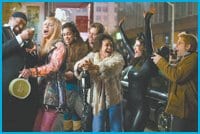It’s been 10 years since Rent opened on Broadway. Launching with a sombre splash in 1996 (creator Jonathan Larson died of an undiagnosed brain aneurism just days before opening), Rent won a slew of awards including the Pulitzer Prize for drama and four Tony awards.
Addressing AIDS, sexuality and drug addiction with emotional honesty, rocking tunes and a multi-ethnic cast, Rent spoke to a generation of disenfranchised youth and attracted a new audience to Broadway.
After several false starts, the movie version finally hits the screen. Loosely based on Puccini’s opera La Bohème, Rent tracks a year in the life of a close-knit group of struggling artists living in NYC’s run-down East Village in the late 1980s. Filmmaker Mark (Anthony Rapp) and his best friend, musician Roger (Adam Pascal) live in a run-down loft now owned by their friend-turned-yuppie Benny (Taye Diggs), who’s threatening to evict them. Downstairs neighbour Mimi (Rosario Dawson) takes a shine to Roger and attempts to draw him out of the cocoon he’s shrouded himself in since his girlfriend’s AIDS-related death. Mark’s ex-girlfriend, performance artist Maureen (Idini Menzel) has jumped the fence and is now seeing Joanne (Tracie Thoms), an uptight lawyer. Then there’s Tom Collins (Law And Order’s Jesse L Martin), back to visit the boys in the company of his new love, drag queen Angel (scene-stealing Wilson Jermaine Heredia). Let the singing and dancing begin!
Rent is adapted for the screen and directed by the most unlikely of suspects, Chris Columbus, best known for the first two Harry Potter films, Home Alone and Mrs Doubtfire. His faithful adaptation retains the edginess of the original without pushing it in any new directions — it’s admirable rather than groundbreaking.
Most of the original Broadway cast has reunited for the film, and the ease with which they embody their characters and the passion of their performances is striking, even if they are now a good 10 years older. Rent newbies Dawson and Thoms rise to the challenge and hold their own, especially in the musical numbers, which are staged with flair and remain intact, with only a couple of minor exceptions.
Exterior shots of New York take the action off the stage and into the streets. While the plot remains a bit soapy, overall, the vitality of the theatrical version has translated well.
Central to queer fans of Rent is the relationship between Tom and Angel. Their duet, “I’ll Cover You,” is filmed on the streets of New York as if a big black man and a Latino drag queen dancing, singing and kissing is commonplace. This nonjudgmental tone of tolerance and respect is carried through the entire film. Particularly affecting is a scene in which individuals at a support group for people with AIDS fade away as they succumb to the disease.
Columbus has created a dynamic film that honours Larson’s vision and will please devotees of the musical. He deserves kudos for keeping the gritty subject matter front and centre. Name the last Hollywood film that featured two interracial queer couples, a heterosexual love story in which both protagonists have AIDS and a surreal performance-art sequence that starts a riot? For those reasons alone, Rent is a must-see.

 Why you can trust Xtra
Why you can trust Xtra


